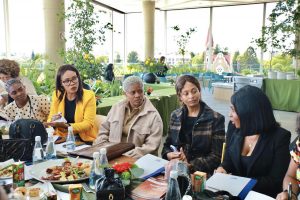
Participants’ pictured during the Women in Media Conference
“As the world grapples with mounting challenges in the political, social, economic and environmental sphere, it goes without saying that prominent issues affecting women such as gender equality continue to take a back seat with structural marginalization”. These were some of the sentiments made by SASSCAL Executive Director Dr. Jane Olwoch during the panel discussion at the Women in Media Conference.

SASSCAL Executive Director Dr. Jane Olwoch and other media experts namely Ms. Emily Brown, Ms. Esther Mbathera and Ms. Jessica Uiras participating in a panel discussion titled ‘Breaking the Silence: Addressing the Lack of Women’s Voices in the Media
Ms. Jessica Uiras, the Program Coordinator of the Namibia Media Trust, Ms. Esther Mbathera, a former PRO and Freelance Journalist and Ms. Emily Brown former Head of the Journalism Faculty at the Namibia University of Science and Technology were also part of the panelists unpacking the topic “Breaking the Silence: Addressing Lack of Women’s Voices in the Media”.
Dr. Olwoch stressed the importance of adequate women representation in leadership positions in Africa. “As women, we are dealing with many complex issues standing in our way to holistic empowerment and realization of gender balance in leadership positions. Nevertheless, one thing positive is that where we are standing right now, we are definitely much better than the past encounters of our mothers and grandmothers.”
Under the Gender Equality SDG Goal 5, of the sustainable development Goals report of 2022 it is stated that gender equality is not only a fundamental human right, but a necessary foundation for a peaceful, prosperous and sustainable world. The report further states that there has been progress over the last decades, but the world is yet to be fully on track to achieve gender equality by 2030. The report also indicates that worldwide, the share of women in managerial positions increased from 27.2 to 28.3 percent between the years 2015 to 2019 yet it disturbingly remained unchanged from the year 2019 to 2020, the first period in which it has been without an increase since 2013.
The report recommends by stating that commitment and bold action are needed to accelerate progress, including through the promotion of laws, policies, budgets, and institutions that advance gender equality. Greater investment in gender statistics is vital, since less than half of the data required to monitor Goal 5 are currently available.
During the Conference Ms Emilia Nghikembua who is the CEO of the Communications Regulatory Authority of Namibia (CRAN) delivered a speech which touched based on the number of challenges women face and how to overcome them to break through the glass ceiling and achieve their goals. Among many of the challenges she pointed out were self-imposed limitations, societal pressure and persecutions.

Pictured during the event from left to right, events founder Ms. Limba Mupetami, CEO of the Communications Regulatory Authority of Namibia (CRAN) Ms. Emilia Nghikuembua, and Co-founder Ms. Jemima Beukes
Co-founder of the Women in Media Conference, Ms. Jemima Beukes said the event is aimed at bringing women in newsmakers, media and communication together so that they can build a trusted relationship and network of women in the media that will strongly advocate for representation in the industry. She lamented the fact that, currently, there seems to be a complete disconnect.
In her words, Ms. Beukes said that “in today’s event we are going to have discussions on what exactly these hindrances are having on women’s voices in advocating for representation in the media. The event which took place in Windhoek on 27 May 2023 and attended by over a hundred women in leadership positions, various journalists and female communication practitioners is conducted every year. Women in Media was founded by Ms. Jemima Beukes and Ms. Limba Mupetami who are all female journalists.

Some of the participants seen during the deliberations at the conference
Overview of the Sustainable Development Goals Report of 2022 on Women
There are two of the Sustainable Development Goals (SDGs) to be reviewed in-depth at the High-level Political Forum; these are the SDG 5 (gender equality and women’s and girls’ empowerment) and SDG 17 (partnerships). These two goals do place women’s needs and challenges in the spotlight – the first has its direct focus on gender parity, and the second touch base on the instrumental role of women in delivering on the 2030 Agenda. A key question is how much are we doing to ensure we reach these two goals by the Year 2030 especially looking at the urgent need for improving women’s access to leadership positions at local, national, regional and global levels.
Gender equality is not only a fundamental human right, but a necessary foundation for a peaceful, prosperous and sustainable world. There has been progress over the last decades, but the world is not fully on track to achieve gender equality by 2030. Commitment and bold action are needed to accelerate progress, including the promotion of laws, policies, budgets and institutions that advance gender equality. Greater investment in gender statistics is vital, since less than half of the data required to monitor Goal 5 are currently available.
The share of women in managerial positions worldwide increased from 27.2 to 28.3 per cent from 2015 to 2019, but remained unchanged from 2019 to 2020, the first period that has been without an increase since 2013.




